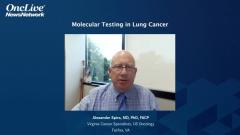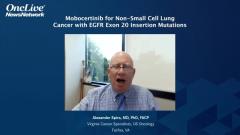
EGFR Tyrosine Kinase Inhibitors and Brain Metastases
Commentary on the use of EGFR tyrosine kinase inhibitors and their efficacy on non–small cell lung cancer brain metastases.
Episodes in this series

Mark A. Socinski, MD: One of the issues in the EGFR mutation–positive population is the issue of brain metastases, either at the time of diagnosis or at some point during the course of their disease. We know that some of the EGFR TKIs [tyrosine kinase inhibitors], drugs like osimertinib have very good CNS [central nervous system] penetration. We have a host of drugs being developed in the exon 20 insertion mutation–positive population, in which the early data suggest there’s some degree of activity. We’ve certainly seen that with mobocertinib, as well as a few others. I think about how confident we are about the CNS activity, and it’s still a little early to tell at this point. I think we can say that there clearly is activity in select patients. What the numerator and denominator are at this point is unclear, and we need some more time to sort these things out before we really know how confident we can be that drugs like mobocertinib really do have substantial and equivalent activity in the CNS like they do in extra CNS sites.
TRANSCRIPT EDITED FOR CLARITY
















































